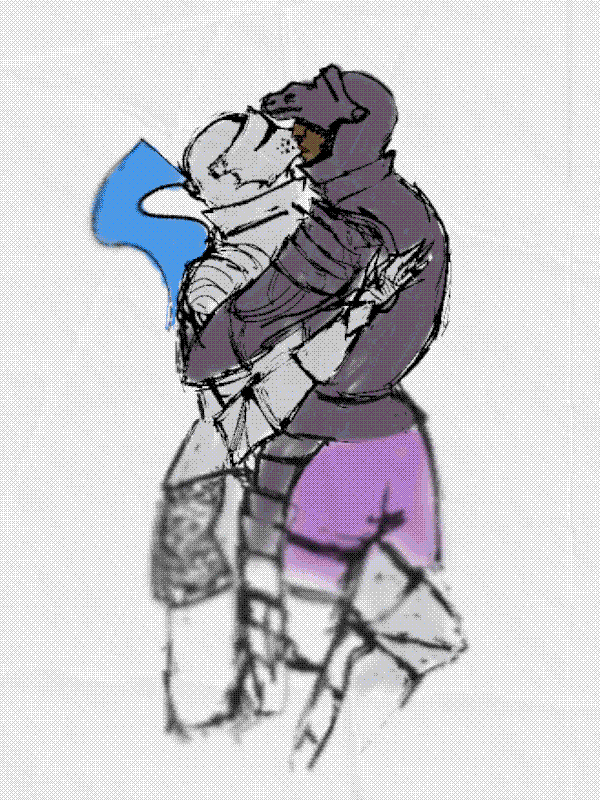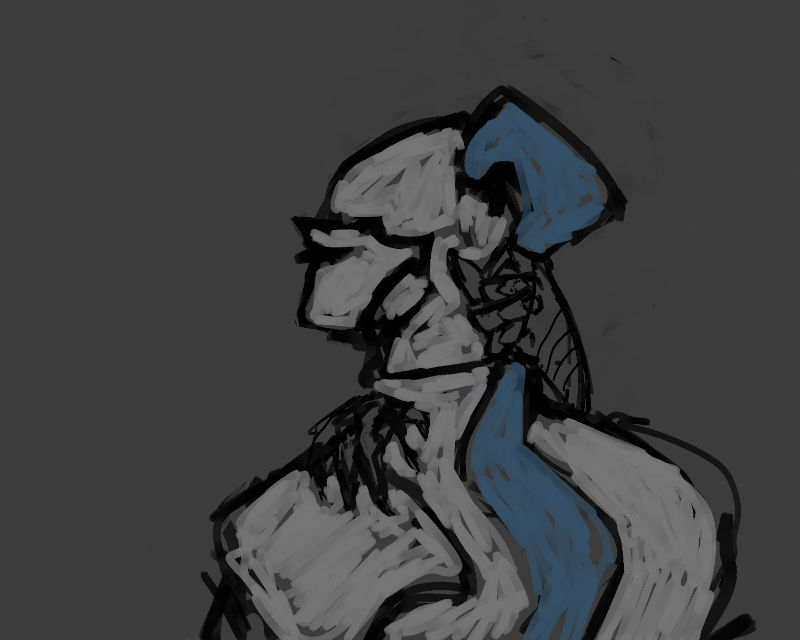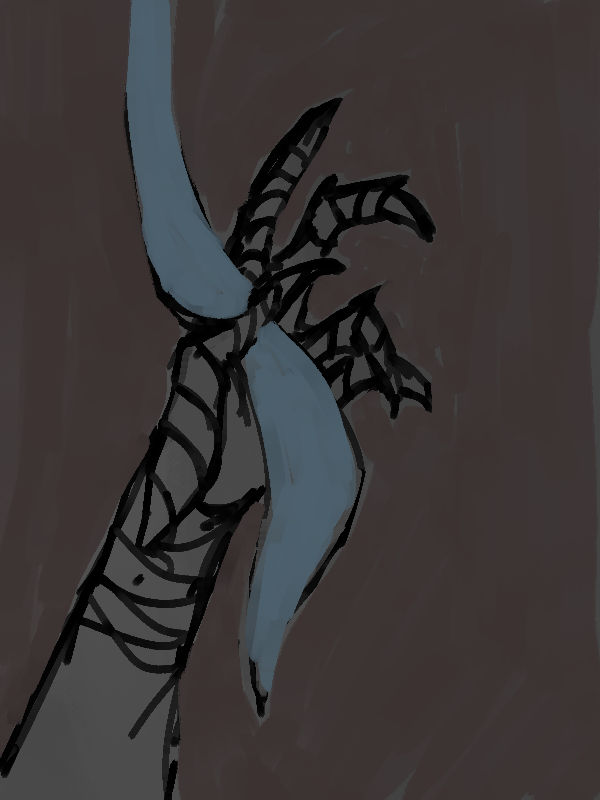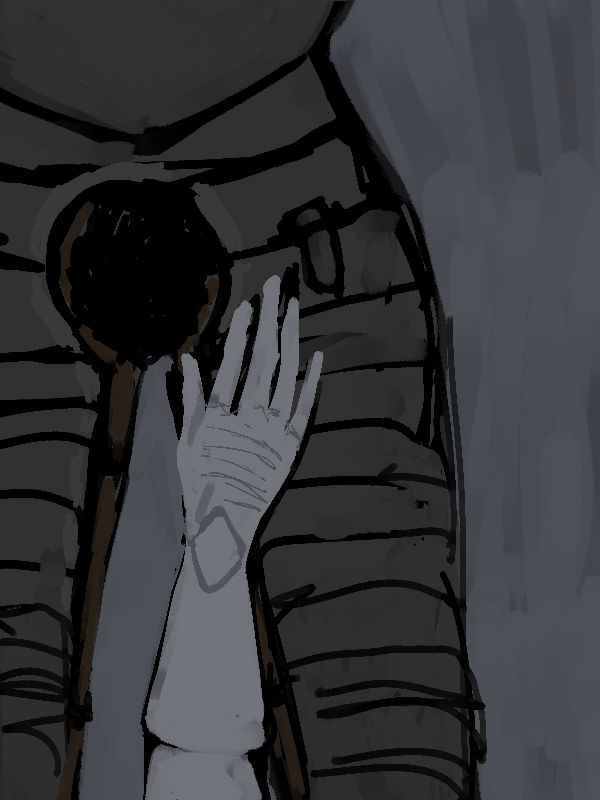summary and analysis
to properly ground my yuri brainrot, i'd like to go through a summary and light analysis of the work as a whole. there doesn't seem to be much talk about it on the internet so this is pretty much all just me, some guy, having read the book a couple times (i also read it for school when i was like 12 but it's not like i remember. don't even remember the teacher. wonder what she'd think of this work). consider this, in some ways, a first draft; i can't really devote myself to a proper full depth analysis at the moment, and i'd rather have something rather shallow but finished than never publishing this at all.
before we begin, a note on pronouns. agilulf's at times referred to as he, mostly in dialogue from characters such as charlemagne. she is il cavaliere inesistente, not la cavaliere inesistente. it makes sense — egregious to think that the purest of knights, completely devoid of a body, could possibly not be a man. bradamante and the narration both use she. i think she could very well be a she/him user and i always love a complicated gender, but i'll stick to just she outside of quotes. i'll also note that (in italian and in portuguese, the language i actually read the book on), while knight is always masculine, armor is a feminine word.
the nonexistent knight is a dreamy series of vignettes, held together loosely by sister teodora's (unreliable) narration — the nun has been assigned with writing the story of agilulf. a structure that's only natural given the allegorical and metaphorical nature of the work. calvino makes use of ambiguity and vagueness to depict (or rather, avoid depicting) the impossible nonexistence of agilulf. the gaps in narrative evoke an old tale from which only fragments survived, a structural choice that suits the subject matter. he writes to evoke the feeling of a medieval legend — why not let parts of it be lost to time?
with the reveal on the last chapter that sister teodora is bradamante, another possibility arises: to view the entire story as the fantasies of this nun. knighthood is vague, idealized, based on romance — teodora (as i'll refer to bradamante as the narrator for clarity) admits to it —, and a contrast to the heavily feminine world of the convent. in this reading, we have bradamante as a gender non-conforming persona for teodora. as much as i dislike "dream theories" for being reductive, i think in this case they actually add another layer of meaning, and both can exist at once. the key of ambiguity is that it's not either/or, but and.
i also have a secret third reading that i'll get to when the narrative does (chapter 7) because it'll make more sense then.
chapter 1
But by now every word, every gesture was foreseeable, as all else in that war which had lasted so many years, its every skirmish and duel conducted according to rules so that it was always known beforehand who would win or lose, be heroic or cowardly, be gutted or merely unhorsed and thumped. Each night by torchlight the blacksmiths hammered out the same dents on cuirasses.
we open with the army. this introduces one of the themes of the work, the monotony of war. a theme which also echoes and mirrors the cloister — and the closet.
we are also immediately introduced to agilulf:
(...) a knight entirely in white armor; only a thin black line ran round the seams. The rest was light and gleaming, without a scratch, well finished at every joint, with a helmet surmounted by a plume of some oriental cock, changing with every color in the rainbow. On the shield a coat of arms was painted between two draped sides of a wide cloak, within which opened another cloak on a smaller shield, containing yet another even smaller coat of arms. In faint but clear outline were drawn a series of cloaks opening inside each other with something in the center that could not be made out, so minutely was it drawn.
agilulf surrounds herself in signs and signifiers, nesting dolls of symbology, keeping herself from showing any vulnerability at all. and as she guards herself she cannot mix in with the other paladins, or anyone else at all. she comes across as unsympathetic in her perfect knighthood, in its own way another layer of armor.
chapter 2
we stay with agilulf as the night falls. her sleeplessness. we see her roam the quiet camp, bright metal under moonlight. without the din of battle she is entirely out of place. the darkness softens shapes, blends them together, brings uncertainty; nothing could be more terrifying. her pale reflective body stands out, as if it were the only solid thing in the fuzzy landscape. yet at the same time: "her armor was pierced through every chink by gusts of wind, flights of mosquitoes, and the rays of the moon"
.
chapter 3
they march to battle, agilulf inpatient with the soldiers' slow pace, the road seemingly all taverns and barmaids.
on the road, the army comes across a man, one moment acting like a duck, another like a frog, another like a pear tree.
"Maybe mad's not quite the right word for him. He's just a person who exists and doesn't realise he exists."
"That's a good one! We have a subject who exists but doesn't realise he does and there's my paladin who thinks he exists but actually doesn't."
in this note, the brief chapter ends.
chapter 4
We country girls, however noble, have always led retired lives in remote castles and convents. Apart from religious ceremonies, triduums, novenas, gardening, harvesting, vintaging, whippings, slavery, incest, fires, hangings, invasion, sacking, rape and pestilence, we have had no experience. What can a poor nun know of the world? (...) God alone knows how I shall describe the battle, I who by God's grace have always been apart from such matters, except for half a dozen rustic skirmishes in the plain beneath our castle which we followed as children from the battlements amid caldrons of boiling pitch. (The unburied bodies that remained to rot afterwards in the fields we would come upon in our games next summer, beneath a cloud of hornets!) Of battles, as I say, I know nothing.
this where sister teodora finally makes herself seen. from the beginning there's humorous duality in her. i have said in the introduction that teodora admits to not knowing war, and borrowing from fantasy and romance. i, rather like her, omitted what always comes alongside those statements, yet more duality and contradiction from calvino.
the battle is an absurd tableau. war is uninteresting and repetitive, an ordered and rehearsed chaos. bradamante enters the narrative as just another anonymous soldier going through the motions: "a knight of the Christian armies with a robe of periwinkle blue over his armor. A crest of long feathers also periwinkle in color waved from his helmet."
. she has been in this life for a long time.
after battle, clean up. a description of her taking off her armor and her muscular body underneath, something unremarkable in any other story, here serves as a reminder of physicality. her armor is dirty, bloodied, unlike agilulf's eternal pristineness. her limbs are sore and sweaty, bruised, scraped.
of course, it's no coincidence that the first appearance of both teodora and bradamante happen on the same chapter. while teodora is presented as a nun from the start, bradamante is introduced as a warrior first, a woman second. knight is a gender all its own.
chapter 5
this is a short one. the battle is over, but the battlefield hasn't moved. agilulf doesn't need food or rest, and thus she wanders between the scavengers to bury her brethren.
"Oh corpse, you have what I never had or will have: a carcass. Or rather you have, you are this carcass, that which at times, in moments of despondency, I find myself envying in men who exist. Fine! I can truly call myself privileged, I who can live without it and do all; all, of course, which seems most important to me. Many things I manage to do better than those who exist, since I lack their usual defects of coarseness, carelessness, incoherence, smell. It's true that someone who exists always has a particular attitude of his own to things, which I never managed to have. But if their secret is merely here, in this bag of guts, then I can do without it."
can she, though?
chapter 6
Now it is my duty to describe that greatest of mortal follies, the passion of love, from which my vow, the cloister and my natural shyness have saved me till now. (...) Did Bradamante know more? In spite of that amazon life of hers, a deep disquiet was growing within her. She had taken to the life of chivalry due to her love for all that was strict, exact, severe, conforming to moral rule and — in the management of arms and horses — to exact precision of movement. But what was around her now? Sweating louts who seemed to wage war in a very slack and slovenly manner. For although knightly chivalry is a fine thing, knights themselves are crude, accustomed to doing great deeds in a slapdash way, only just keeping within the sancrosanct rules which they have sworn to follow and which, being so firmly fixed, take away any bother of thinking. War anyway is made up of a bit of slaughter and a bit of routine and doesn't bear being looked into too closely.
there's no more playing coy: this is fundamentally a love story. not only that, but we have the contrast of war and love that's brought up again and again throughout the book, and the great contradiction of agilulf's character — a body made for the sole purpose of violence that instead loves and is loved.
chapter 7
since this part is told through bradamante's point of view, what prompts the doubt in agilulf's knighthood isn't made clear to the reader. it ultimately does not matter. no one can doubt her heroism and chivalry, but the army is a bureaucratic institution. if it wasn't one thing it would be another, a shifting goalpost. agilulf creates unease through her perfect nonexistence, and so she is made to leave in search of proof of her knighthood. needless to say that this is very transgender.
with no reason to stay in an army stripped of its true chivalry, bradamante follows.
here bradamante fantasizes through teodora. by this i mean teodora says she imagines what bradamante is fantasizing, obscuring her desire through the nun persona. after finishing the book, we know they are one and the same, but the nested personas (much like agilulf's nested coat of arms) allow her to keep a distance. this is my third reading of the narration: an inversion of the story as a nun's fantasy — teodora is an invention of bradamante's, and not the other way around.
She ran up to Agilulf, kneeling, sword resting on her palms.
"I am Bradamante and my sword is yours. I make mine your quest", she said, taking that shining armored hand in hers, the sound of metal against metal, her lips to cold metal, kissing the back of the hand, the palm, the fingertips. The fingertips brushed her cheeks in the perfect deliberate movements of Agilulf.
and so, bradamante fantasizes her meeting with agilulf while galloping behind her. she inverts the roles, dreams of gallantly offering her protection, kneeling and kissing her gauntlet and offering her sword and life, no matter how nonsensical that'd be. we are not told how the first meeting actually happens; the fantasy — not just one of chivalry but of erotism, bradamante's dual desire of being agilulf and being with her — merges into the mundane, agilulf going through the rituals of not-eating.
chapter 8
agilulf's quest brings them to the castle of dowager priscila, and before entering they encounter a pilgrim who warns them not to fall for her trap. she seduces knights, he says, and ruins them — how, exactly, i can't say i understand. he himself used to be a knight, and the region is full of pilgrims; every now and then another appears. nevertheless, they keep going.
"Are you not afraid of the flames of lust?"
Agilulf was slightly embarrassed.
"Well, we'll see..."
a tournament is being held. the knights have left the war camp to join this pantomime happening in the middle of it. all war is performance but here the artifice is the whole point. and this is the event where agilulf's knighthood (and thus existence) falls apart — but we'll get to that. first, there's priscila.
priscila knows agilulf. more importantly, she knows what she is and what she is not. and she offers agilulf information that might lead to her proving her knighthood — if she spends the night in her room.
chapter 9
"What the nightingale sings about is love. And we..."
"Ah love!" cried Agilulf with such a brusque change of tone that Priscilla was alarmed. Then, without a break, she plunged into a dissertation of the passion of love.
in this rather comedic chapter (and despite the tragedy, this is a satirical book), agilulf staves off priscila's advances in a nearly scheherazadical manner. she carefully lights the fire, "[praising] the flame of this or that type of wood, enumerated the various ways of lighting fires in the open or in enclosed places"
. she unmakes the bed to remake it according to the highest standards. she shields herself from the vulnerability that comes from intimacy.
"Don't you even loosen the sword from its scabbard?"
"Amorous passion knows no half measures."
despite agilulf's deflection, priscila always responds in ecstasy. the nonexistence is as erotic to her as it is to bradamante. at dawn she is spent, and if asked she would certainly have called all that lovemaking — and mean it too.
i find it somewhat odd that this scene is not between agilulf and bradamante. however, on second thought, while teodora is an omniscient narrator, in full control of the narrative, she is not an omniscient person, and is overall unreliable. it's not a stretch to claim (in watsonian fashion) that this scene exists mostly in her head, and i also believe making it a conventional "characters getting closer" scene would be an awfully bland approach to their relationship.
chapter 10
priscila gives her a lead, one of the competing knights, but the tournament is a world of bets and favors and pride. due to her not being exactly a knight at present, agilulf cannot compete, so bradamante becomes her champion — a unique form of courtly love. the proof of agilulf's virtue lost in a game of telephone and pettiness — at one point it's a certain ring, then it's a letter kept by so-and-so, and no one ever seems to make up their mind.
here, as we approach the end, teodora struggles with her narrative.
When I think of all the obstacles and flights and deceits and duels and jousts that I still have to put on paper I feel rather dazed. How this discipline as convent scribe and my assiduous penance of seeking words and all my meditations on ultimate truths have changed me. What the vulgar — and I too till now — considered as the greatest of delights, the interweaving adventures which make up every knightly tale, now seem to me pointless decoration, mere fringe, the hardest part of my task.
I long to hurry on with my story, tell it quickly, embellish every page with enough duels and battles for a poem but when I pause and start rereading I realise that my pen has left no mark on the paper and the pages are blank.
and so she rushes through this chapter. underneath the excitment of the tournament, the proof is simply a matter of bureaucracy, a chase of documents and eyewitnesses and this and that from fifteen years before. tragedy is a matter of time, and dwelling on what preceeds it feels pointless. suddenly the time has come for agilulf to present the proof that she deserved to be knighted, fifteen years ago.
chapter 11
the quest is failed, doomed from the start. agilulf's knighthood was built upon air. that it was still built regardless is of no consequence.
if she only exists as a knight and that is no longer real... she flees the pavilion, and bradamante follows.
"Don't you see how this armor has lost its inhuman whiteness and become a covering for battle, which is exposed to every blow, a tool, patient and useful?"
agilulf collapses. in the quest to prove herself the perfect knight she has instead lost the very core of her being. despite the inevitability, her death (or perhaps rather her end) is her own decision. she's still so afraid of disappearing. she cannot bear to go alone, to simply fade. she had never before known defeat. maybe this isn't defeat either. she's now entirely vulnerable; or rather, she now allows herself vulnerability, fully open to bradamante's affection — and recognizing her own love for her. she kneels and wishes — (not) for the first time? — she had lips to kiss bradamante with. never before has her helmet felt so empty.
the smell of musk and iron. of course their sex would smell like battle. that's what armor is made for.
"Bradamante's estoc pierced through the mail at Agilulf's throat, sliding between the rings with a grinding noise, then gliding against her helmet like a sharpening stone. The tip touched the inside of her cuirass, sending shivers through her iron body."
bradamante lies beside her. she could promise not to fall asleep but she is only human. the end of her vigil must come. which is worse, sooner or later? she awakens to a cold empty suit of armor. of course.
ultimately, what kills agilulf is love, simply because she can no longer exist as this single purpose war machine. calvino uses the idealized romantic knight, the knight in shining armor of fairytales where war is distant and abstract but reminds us that war is still war.
chapter 12
teodora ends the manuscript. she reveals herself to be bradamante, in the convent "meditating and jotting down the adventures that have happened to me, so as to try and understand them"
. agilulf is gone, the story has no real conclusion; life seldom does. and so we end the book in a melancholic note.
I go to put away parchment, ink, quill, and the gauntlet is there, polished and identical but inanimate. Still I put my lips to the metal.
i must say there is wasted potential for an autoerotic scene to close this tragedy. of course i'd say that. worry not, for i've sketched a world where this missing scene exists. that's what this page is here for.
and thus ends my summary / analysis, at least for the time being. while i'd like to revisit it — since this is ultimately fairly shallow, definitely more summary than analysis — i'm satisfied enough with the result. as i often say, i'm just some guy. but now i hope you can understand why i must draw these specific knights fucking on the surreal empty plain.












